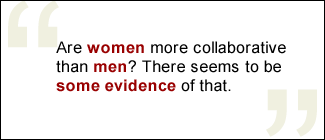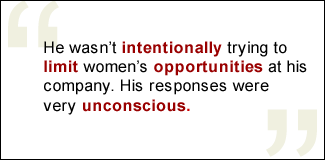Last January, Harvard University President Lawrence Summers found himself in a firestorm after suggesting, at an academic conference, that one reason that women rarely achieve high positions in certain sciences is because they are innately different than men. Those who criticized Dr. Summers generally fell into two camps: those who decried his theories on women's innate abilities and those who were angry that the president of Harvard would make such an inflammatory statement. But there is another camp altogether, and it's made up of people who study leadership and know something about women in high positions -- people who might wonder how Dr. Summers came to those assumptions at all. One of the best minds in that camp is Robin Gerber.
 |
Gerber is a senior advisor to Â鶹´«Ã½AV on leadership and a senior fellow in executive education at the Robert H. Smith School of Business at the University of Maryland. She's also a national commentator and speaker on leadership and a consultant to Fortune 500 companies, universities, and governments.
Gerber is the author of two books on women in leadership: Leadership the Eleanor Roosevelt Way: Timeless Strategies from the First Lady of Courage and Katharine Graham: The Leadership Journey of an American Icon -- out this month from Penguin/Portfolio books -- about the legendary publisher of The Washington Post. There isn't much Gerber doesn't know about leadership, and one of the things she knows is how people come to their conclusions about gender roles. It's bad news for women.
It's bad news for business too. In the first four months of 2005, 441 CEOs left their jobs, which is an 88% increase over last year. This suggests that there is a growing list of companies looking to fill leadership vacancies -- and enormous opportunities for America's established and upcoming leaders. Overlooking women for those positions ignores a vast talent pool and undermines companies' general profitability. In this interview, Gerber tells what overlooking women as leaders costs companies, what women bring to the boardroom table, and what women -- and men -- need to become truly great leaders.
GMJ: How do you define leadership?
Robin Gerber: I define leadership as motivating others toward a common, ethical purpose. You must have that element of an ethical purpose for the kind of leadership that we analyze.
GMJ: Well, tyrants have very different leadership methods than do business leaders. Can anybody develop leadership skills? Or are those skills innate?
Gerber: I absolutely believe that anyone can develop leadership skills, and I don't think anyone's really starting from ground zero. We have all kinds of different talents that we're born with, and we're learning more about that as we learn more about genetics. We develop styles based on who we are and the schema we learn from our environment. You develop different styles throughout your life because of the way the culture treats you, the way other people treat you, and the way you react to the way you're treated because of those schema that you have.
Many people don't even recognize what they do as leadership. For instance, in my book about Eleanor Roosevelt, I talk about mothering as leadership. Mothers motivate their children toward various common missions and purposes around common values. But I also think that leadership is highly circumstantial. You might have traits for leadership -- the ability to take risks, to be decisive, or to communicate well, and have strong convictions -- but not have a place to use them. This was true for Katharine Graham, whose most dramatic acts of leadership came halfway through her life.
GMJ: What are the styles of leaders?
Gerber: I think there are many. The ability to communicate is key because you are motivating and influencing others and inspiring people -- all of those things are part of communication. Conviction is another. Leaders who don't have strong conviction about their purpose are not as effective. What was so striking about Eleanor Roosevelt was her deep conviction, which cut against what people expected of her because she came from a wealthy class, the upper class. But she had a tremendous conviction to help poor people and to work for civil rights. The fact that she had come from a racist environment made her conviction even more striking.
GMJ: How do you know conviction when you see it?
Gerber: Conviction is not just having a belief, but holding strongly to it. Conviction is closely aligned with courage, which is another trait that leaders have -- the courage to live up to their convictions. It's one thing to talk about change; it's another thing to actually do something.
And that brings me to the idea that leaders are people of action. I know that sounds simplistic, but the truth is that there are lots of people who talk a good game, but they're not actually doing anything. Leaders are people who just do it. And that leads to the idea of persistence, which is another important leadership quality. You can't do it just once, because things that require courage and conviction are difficult. You're trying to make change, which not all people are going to like; there will always be dissenters and obstacles. The only way to achieve anything is to be a truly persistent person. I think leaders are people who don't give up.
GMJ: Do the qualities of leadership differ between men and women?
Gerber: Well, I'm not really sure. I get asked that question a lot, and I've really been thinking about whether it's even the right question. Is there some research that shows some stylistic differences? Yes. And again, by style, I mean not what's inborn, but what's developed.
One style is collaboration. Are women more collaborative than men? Well, there seems to be some evidence of that. There's this idea that women use more words than men, which would lead to a different style of relationship because they're more relational; they're discussing more and trying to talk things out more than men. Recent research on the human brain provides some evidence that there might be biological differences. We know that men mostly solve problems using the right side of their brain, while women use both sides of their brain. But do we really know what that means? In truth, no, we don't.
At some point, my guess is that we'll have a better handle on it, and we'll be able to say more decisively if there are real differences. I guess the way to put it is this: I'm not sure we're ready for that question. Nor is it a question I think that's going to get us very far. I think the better question is: In what way do we think that women's and men's leadership is different?
GMJ: Why do we think that?
Gerber: Because gender differences are a primary -- maybe even the central -- part of our schema. They are the first differentiator. In the workplace, what goes along with our thinking that someone is a male or female? A lot. A ton. We are just hugely invested in all kinds of preconceived ideas about what men and women can do. The unfortunate part is that what we believe a leader should do is not consistent with what we think a woman can do. So all of the criteria for leadership that we talk about in the workplace -- a leader has to be strong, a leader has to be assertive, a leader has to be aggressive, a leader has to be able to command people -- no one would even blink an eye if you said, "And John can do that." But if you say, "And Mary can do it," it counteracts people's gender schema for what women, in fact, can do.
 |
And so women, in reacting to that, must deal with this great paradox. "Well, if I show that I can be aggressive, then I should be accepted as a leader," is one way they might react. Except that if women do act in ways that would be perfectly acceptable for men, they're seen as bullies. It cuts against what people expect from women, and it's doubly bad for them.
GMJ: What effect does this have on women in the workplace?
Gerber: There's a lot of research on this too. Say you bring in two people, a man and a woman, both Harvard MBAs, both just graduated, both with the same exact background, and you put them into management positions. Over time, the curve of their careers goes upward, but the man's goes up at about three times the rate. He succeeds much more quickly because of the gender schema we're talking about. It affects women's confidence in themselves too. Their self-efficacy, in psychological terms, is affected by this. Those who suffer from these micro-inequities start to integrate them into their own belief systems; it's like a drip, drip, drip, and after a while, it starts to soak in. In studying Katharine Graham, I could really see this. She started to accept what the men who ran The Washington Post, who wanted to keep her out of the financial side, were telling her -- that she was a financial idiot. She lost a lot of confidence.
GMJ: Some people think that male executives conspire to keep women down.
I don't believe that at all. I think it's highly unconscious. In fact, I'll give you an example from a meeting I was at. After my talk, this guy said, "You mean, if I get an evaluation, and the man's is higher than the woman's, are you telling me I should take the woman just because she's a woman? I'm going to take the man." And I said, "No, what I'm saying is, question your assumptions. Ask, 'Who wrote the evaluation? How was it scored? Who made up the questions on it? What kind of evaluation was this? Was it truly done in a neutral, non-gender prejudicial way?' And if you're convinced it's fair, that's fine."
Judging from the look on his face, I think I'd have to say his evaluations weren't. A lot of evaluations are very subjective -- they're a checklist that managers complete based on their perceptions. Well, of course their perceptions are colored by their gender beliefs. And so somehow, the men are just that little bit better.
GMJ: I would worry about his employees.
Gerber: He wasn't a bad guy; he wasn't intentionally trying to limit women's opportunities at his company. His responses were very unconscious. But it goes back to your original question: What are the differences between men and women? The real question is: What do we believe are the differences between men and women?
GMJ: Let me play the devil's advocate. Considering how hard it is to overcome these schema, why bother? Assuming you can avoid federal law and bad PR, why bother putting women in positions of leadership at all if so many people are going to doubt them?
Gerber: Profitability. A new study of companies, some that had gender diversity and some that didn't, found that the ones with gender diversity were actually more profitable. (See "The Bottom Line: Connecting Corporate Performance and Gender Diversity" in the "See Also" area on this page.) It makes perfect sense -- if you're drawing from a smaller pool of people, which, of course, you are if your preconceived ideas cut women out of the promotion or hiring process, then you're limiting your pool of available talent. And you're limiting the kinds of ideas and approaches that you have in the company.
-- Interviewed by Jennifer Robison
